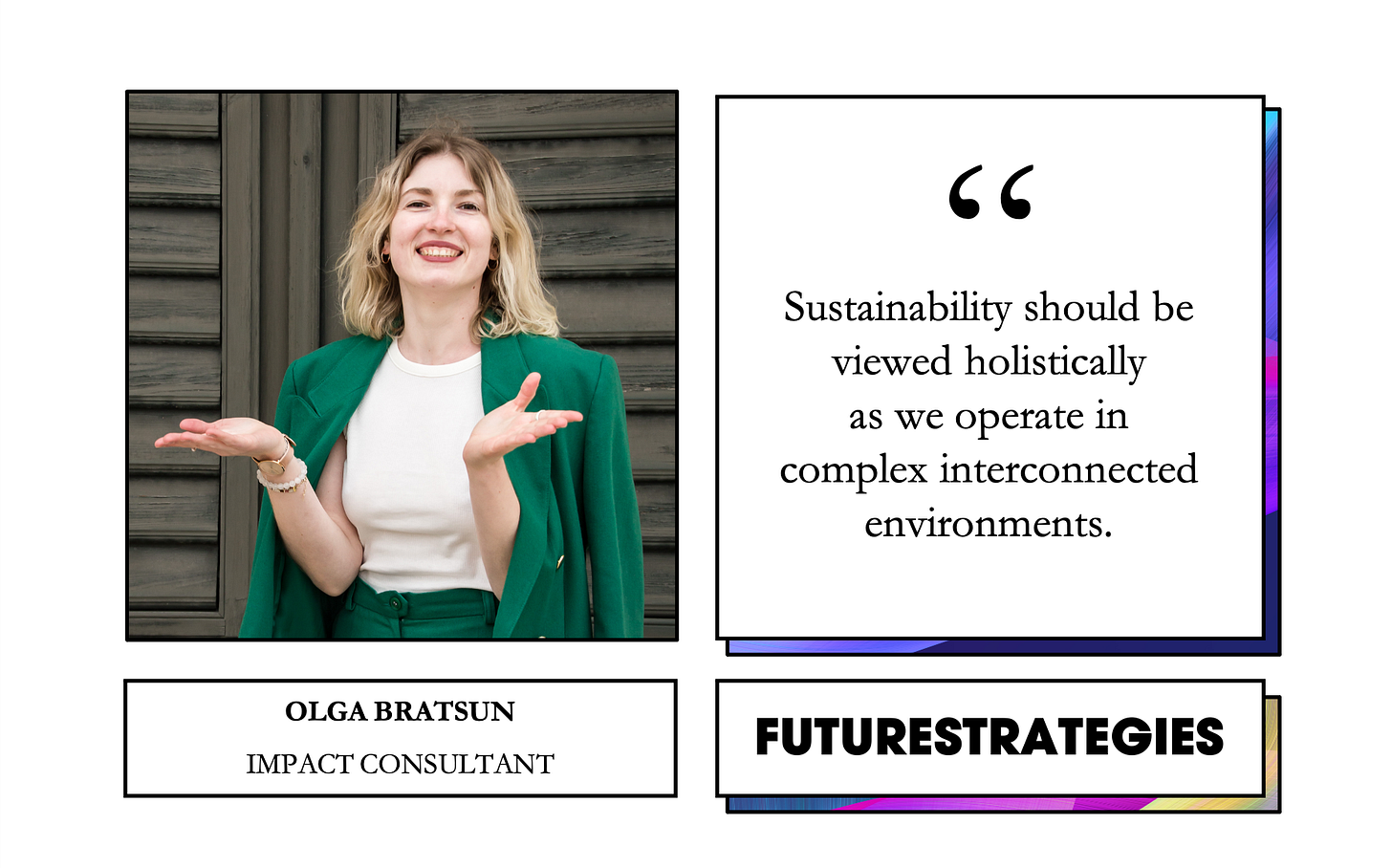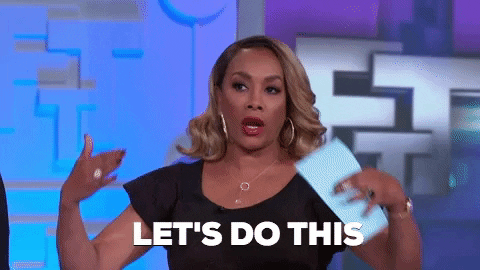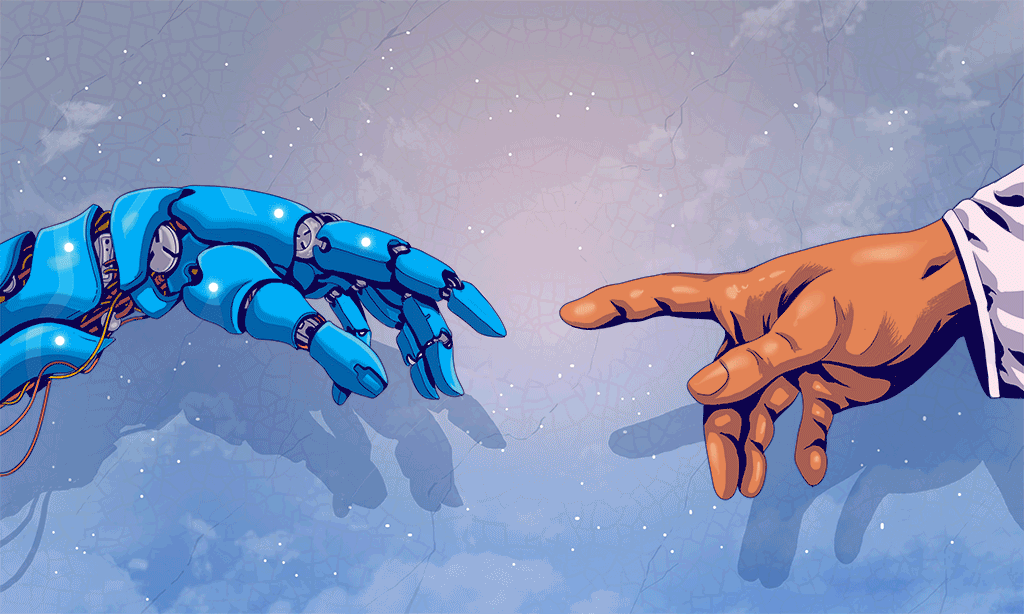🌳 Changing the world with Impact Consulting
Interview with the Impact Consultant Olga Bratsun: 5 questions on sustainabilty, goals, the way to get there and the role of startups and technology in reshaping our world.
Hallo 👋 mein Name ist Florian Schleicher und das ist der FutureStrategies Newsletter von FutureS. Schön, dass du mitliest 💚 Wenn du strategisches Marketing lernen willst, ist meine Simple & Sustainable Marketing Academy genau richtig für dich.
A couple of weeks ago, I wrote that the future is sustainable impact (link in German).
And for real impact, there also has to be a set of measures taken in organisations.
Like the beautiful saying goes:
Do good and talk about it.
So I spoke to my friend Olga Bratsun, an Impact Consultant (check out her bio at the end of this posting).
She told me about the roles of start-ups for a more sustainable future, her thoughts on the real impact of organisations as well as her vision for the future of business.
🎙 The Interview
Apart from the obvious future of our planet - why do you find the field of sustainable business so interesting?
I believe sustainable business is the only way to think about the future of business. It should be the way we live and work as it directly affects our planet and humankind as a whole.
What is the ultimate reason for any business creation? To solve the problem. Why solve made-up problems if we can solve real ones? Even if (when!) we tackle the climate crisis, we will still have plenty of problems to solve, including those we created while doing business as usual.
What makes a business sustainable? And what doesn’t? I see a lot of companies now declare, that they aim to be sustainable or declare big goals. Is that good as well?
Simply offsetting your carbon emissions without having a strategy for reducing them in place doesn’t make your business sustainable.
Sustainability should be viewed holistically as we operate in complex interconnected environments. If you concentrate only on one aspect of your business, you can easily make it worse across other dimensions. While there is a global agenda (eg, SDGs or the Paris Agreement), every business is different and will have different definitions of sustainability. Being intentional in everything your company does, and understanding both the positive change you want to create and the negative impact you might have makes your business sustainable.
It is great to see impact and sustainability gaining momentum. Still, it is really a shame that many companies use it for purely marketing purposes, make false claims or buy “good” certifications. It confuses consumers, creates a false peace of mind, and doesn’t give an advantage to truly impactful companies. For this reason, I believe that the new regulation on the European level is a positive trend (eg, EU Taxonomy, the CSRD, Sustainable Finance package, and initiatives on substantiating green claims).
What is your advice to someone reading this blog post, who wants to play a part in a sustainable future and who is now wondering where to start the road to becoming more sustainable - both on an individual level and for the company she/he is working for?
Start by looking at the 17 Sustainable Development Goals and their targets to understand the global challenges.
You can also check the images demonstrating the interlinked nature of SDGs. What issues and goals resonate with you the most? What can you do personally to help achieve these goals? The general recommendation would be to transition to a (more) plant-based diet, shop less and responsibly, and choose greener modes of transportation (eg, bike, walk, take a train instead of flying, etc). Lastly, stay hopeful and don’t get discouraged :)
For organisations, it is of course a bit more complex. I can share with you a top-level overview of the approach I use in my work with companies and if your readers want to know more, they can get in touch with me directly.
Start by answering the following questions:
Where does your organisation fit within the global agenda?
What positive impact do you want to create with your product and service?
Don’t forget to look at your business critically. What negative effects are associated with it? If you are in a sector with high environmental costs (eg, manufacturing), consider going through a thorough environmental impact assessment. There are plenty of companies offering this service.
Once you understand the positive impact you want to create and the negative impact that needs to be minimised, narrow it down. What are your top 2-3 priorities? What impact metrics will you use to track your progress?
This is also not the end of the process because you will need to implement what you have developed and reevaluate it from time to time :)
If you work for a bigger company, you can also check if there are any sustainability practices in place already, who is responsible for them and what the recently approved CSRD rules mean to your organisation.
What roles do start-ups and especially tech companies play, when it comes to impactful sustainability?
Good question! Startups are innovative, scalable and agile. They are often better equipped to address global problems than bigger companies or governmental institutions because they are able to react and adapt faster. To become sustainable, big companies need to undergo quite a serious transformation that often meets internal resistance. On the contrary, young companies have an opportunity to be sustainable from the very beginning. This is my intention and vision, that all new companies entering the market have a) an intended positive impact and b) a sustainable way of doing business.
Technology is an integral part of our lives. With the help of modern technology, we can both accelerate the transition to a more sustainable and just world and mitigate and/or adapt to some risks associated with the climate crisis. Some problems can only be addressed with technology. For example, the transition to clean energy is impossible without tech innovation. Taking into account the alarming statistics you shared in your question, no doubt clean energy is one of the key focus areas of the modern world. Back to my answer to your previous question - tech companies must be aware of their carbon footprint and be intentional about reducing it.
With all of this being said, impactful and sustainable innovation doesn’t happen in silos. Young companies need support from investors, governments, bigger businesses and the general public. We have to talk to each other and collaborate. tech2impact for example was created by Sasha Lipman in 2020 with exactly this purpose - as a platform where everyone who uses technology to create a better world, from startups to investors to experts, can connect, exchange and partner.
What do you think is the future of sustainability?
I firmly believe that being sustainable and purposeful will be normal in the future. For new generations climate crisis is a reality, they grow up knowing about it and young people are always the driving force for change.

What do we need in order to accelerate the transition to a more sustainable world? A few things that I’d like to highlight include:
a) Education, increasing awareness of the issues and developing a deep understanding of how interconnected everything is
b) Dialogue and partnerships between businesses, NGOs, and government
c) Regulation making impact and sustainability an absolute must (eg, incentives for impactful businesses and penalties for those who don’t follow)
d) Continue increasing capital inflow into purpose-driven businesses, impact investing.
3️⃣ Last Questions
To finish it up, here is my short Q&A round with Olga:
What recent book or podcast can you recommend?
The Free Time podcast by Jenny Blake and “It Doesn’t Have to Be Crazy at Work” by Jason Fried & David Heinemeier Hansson
Which company or brand does a really good job when it comes to impactful sustainability?
Ben&Jerry’s
The future of sustainability is…
intentional and in our hands - wake up and act now.
〜 End of Interview 〜
🙌 The solution is you
We have a problem - our old model of doing business is hurting our planet and threatening our human existence as we know it.
Change is hard to create when the old system is so tightly clinging to its survival. As long as we think that the earth is a resource to be mined and shaped to meet our human desires, we will not advance.
“The natural landscape is not just a backdrop for our human drama and any damage done is an unfortunate externality to our greater purpose.”
Casper Ter Kuile
What gives me hope is the fact that great minds like Olga and so many others are consistently working to create a more sustainable future.
Not for the planet. Earth will endure.
But for us and the things we as humans have come to enjoy.
Organisations (which are led by humans) need to reconnect with nature and find new solutions for existing problems. Something we as humans have shown to be fully capable of.
“Regeneration in value creation and delivery involves seeing nature as a ‘partner’.”
Juan Pablo Casadiego
So let’s do this.
Let’s work together, bring brilliant minds into the room, and think of a more sustainable future!
Thank you for reading,
Olga Bratsun is an innovation + purpose consultant on a mission to bring more positive impact to the world of business. Olga has been involved in the purpose economy space for many years. From CSR campaigns and impact strategies to innovative services and programs for impact (tech) entrepreneurs, she has been helping companies to be a profitable force for good and bring their ideas to life. Since 2020, she is also part of the founding team at tech2impact.
Are you looking for some more stuff to read?
🌍🔜 Die Zukunft ist Impact Marketing - Wie wird nachhaltige Wirkung auf Planet, Profit & People künftig Unternehmen prägen und was ist Impact Marketing?
📈 Von Hyper-Growth zu Healthy-Growth - Interview mit Dieter Rappold über die Zukunft von Start-Ups: 5 Fragen rund um die Zukunft 2023
🧤 5 rechtliche Fragen über Greenwashing - Interview mit zwei Rechtsexperten
✅ Green Marketing mit Strategie - Was braucht es für strategisches Green Marketing und welche Unternehmen machen einen guten Job?










Ein gutes Beispiel für das Umdenken in Richtung Nachhaltigkeit bieten die neuen Verfassungen von Bolivien und Ecuador, wo die Natur eine eigene Rechtspersönlichkeit erhält und der Schutz der Umwelt für das Wohlbefinden der gegenwärtigen und zukünftigen Generationen rechtlich verankert ist.
Details dazu siehe: http://www.gudynas.com/publicaciones/GudynasPolitischeEcuadorBolivie09.pdf
Ein sehr, sehr lesenswerter Artikel.
LG Kurt Trolp
www.trolp-marketing.at